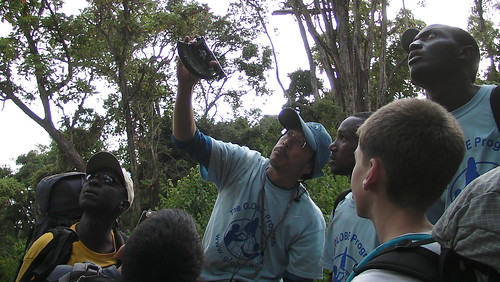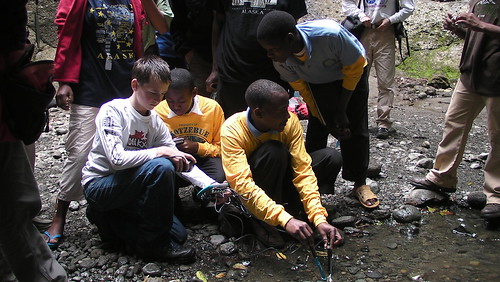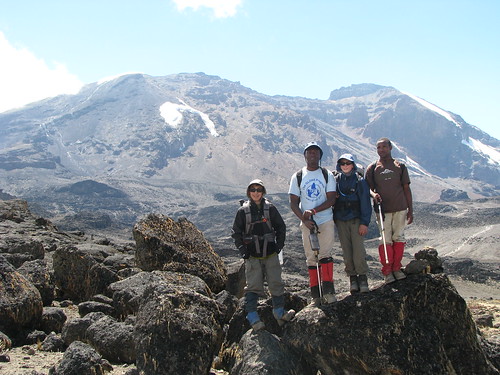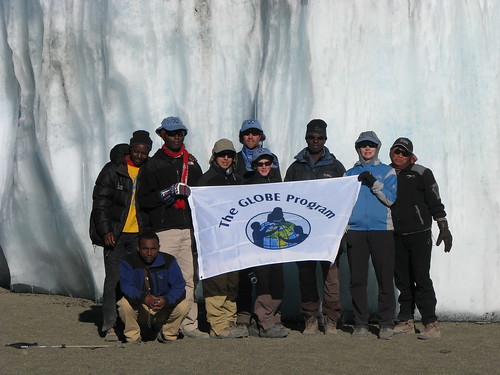To say that the journey to the summit of Mt. Kilimanjaro was a success would not do justice to the wonderful personal and scientific experiences the team had. From taking the first steps toward the summit on Sunday 23 September to summiting the following week and boarding flights to return home, each team member gained something that will stay with them forever.

Collecting data in the rainforest

Collecting hydrology data

Taking a break to pose in front of the summit

Taking a picture at the summit with one of Kili's glaciers
To reflect on their experience, the bloggers were asked: Looking back to the beginning, you discussed your personal and scientific expectations for The Xpedition. Summarize your experience with respect to those expectations. How do you envision your experiences during the trek to influence your scientific or educational activities in the future? And how has this trek further cultivated your love of learning?
Maddy
To say that this trip has changed my life is no understatement. I expected to be blown away by the science, culture and challenges along the way… my expectations were anthills in comparison to what Kili delivered! It was phenomenal–simply incredible. The main way I’ll be able to carry Kili with me in my scientific/educational activities in the future is by sharing stories. I learned an extraordinary amount about the culture and history of Tanzania, science of Kilimanjaro, climate change and globe protocols in general. All of our guides were so knowledgeable… botanists, biologists, astrologists and survivalists wrapped into one person (and comics too… they sure got me a few times!). I can’t wait to pass what I learned along to my peers and teachers! I know I’ll easily be able to apply something I learned on Kili to my life here every day.
On our second to last day, I was walking down the mountain with Art (a photographer) and John. We were chatting about all the incredible places they’ve both visited, and at one point they said “the problem with traveling is the more you see, the more amazing things you discover, and the more you want to see!” I couldn’t have said it better: now that I’ve seen the beauty of Tanzania, met some incredible people, and learned about the very unique science behind the mountain… I just want to get back out there and do it all again!
John
My personal expectations were well exceeded! The land and the people of Tanzania have been so diverse and interesting that it has been very easy to feel comfortable in this place. All of the porters and guides have been friendly and eager to learn and to share their knowledge. They have helped me discover the beauty of life in Africa as well as the balance of the land and animals.
From a science perspective, it was a great learning experience to follow the researchers in making observations and looking at the data from the streams. This information is not only important to the biomes and habitats on the mountain, it also applies to the people and crops that live around the base of Kilimanjaro and depend on the rivers and streams.
With this new knowledge I will find various ways of bringing the information into the lessons and activities the students will learn. From a geological aspect, the volcanic history and landscape of Kilimanjaro provides similarities as well as contrasts to our Southern California past. This will also include looking at the tectonic action and making connections in both locations. When looking at the wildlife in Africa, comparisons can be made with the flow of energy and the adaptations in the organisms that occupy both regions. The African flora and fauna also provide a new and interesting set of creatures and plants that are familiar and fun for the kids to learn about.
Seeing Africa for the first time has really excited me toward learning more about the natural world outside of my own region. There is so much diversity covering a huge number of plants and animals. By seeing these factors first hand, and witnessing the daily activities on the Serengeti and Mt. Kilimanjaro, it is easy to see how bring this new information to the students will help in adding motivation to my learning and teaching goals.
From The GLOBE Program Office, we hope you have enjoyed reading along with our series from Mt. Kilimanjaro as much as we have writing it and passing it on to you. Thank you to our team who worked hard to bring us their experience from the mountain as well as for collecting important data that will help us understand even more our environment.

Congratulations GLOBE Xpeditioners! You made the world focus on Mt. Kilimanjaro for a week they will never forget!
It’s so great. A project make people understand about environment on earth. And people wil protect it
I read the whole blog and just can say: Congratulations to the whole team. The spirit can’t be taken away from you guys. You will always remember this adventure and most important: The people who read it, will as well be part of it. Thanks guys, thanks